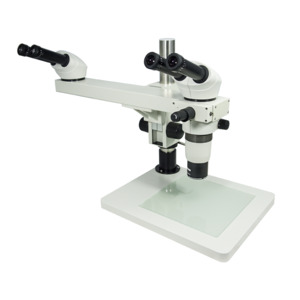
- Description
- Specifications
- Documents
Stereo microscopes are also known as the anatomical microscopes, or dissecting microscopes. Many people would refer to stereo microscope as Stereo, and the Continuous Zoom Microscope as Zoom.
Stereo microscopes are a kind of binocular microscope that observes an object with both eyes from different angles, thereby causing a stereoscopic effect.
The stereo microscope adopts two independent optical paths, and the left and right beams in the binocular tube have a certain angle, generally 12°~15°. The objects are observed from different angles of the two optical paths, causing a three-dimensional effect on the eyes, and therefore a stereo microscope is a true 3D microscope.
Compared with other compound microscopes, stereo microscopes belong to the low power optical microscope. The field of view of stereo microscopes has a large diameter, its magnification is generally below 200X for optical magnification. When the magnification is greater than 40X, the stereoscopic effect of the image will be relatively poor.
Therefore, the advantage of the stereo microscope is not that its magnification is large, but that its working distance is long and the depth of field is large, which is particularly suitable for observing objects with a high degree of three-dimensional features.
For compound microscope with a single optical path, what we see is only a flat image. Although most compound microscopes have two eyepieces, what we actually see is one and the same image, and this is just to facilitate the observation habits of our two eyes. The stereo microscope has two optical paths (two objective lenses or one common objective lens), and only the three-dimensional sense produced under observation of the two optical paths can make people judge the three-dimensional spatial position of the observed object, which can generate a sense of distance under the microscope. Therefore, only stereo microscope can be used for operation under the microscope which is very suitable for surgery, dissection, industrial welding, assembly, precision instrument repair and so on.
The stereo microscope can be equipped with a wide range of accessories. It can be combined with various digital cameras and photographic interfaces, microscope cameras, eyepiece cameras and image analysis software to form a digital imaging system. It can be connected to a computer for analysis and processing, and its lighting system also has different options for illumination, such as reflected light, transmitted light, etc.
Stereoscopic microscopes are widely used in various fields, such as biology, medicine, agriculture, forestry, marine life, and other various departments. They are especially used in industry, for macroscopic surface observation, analysis, and microscopic operations.
Stereoscopic microscopes were invented by American instrument engineer Horatio S. Greenough in the 1890s, manufactured by Carl Zeiss Company of Germany, and are widely used in scientific research, archaeological exploration, industrial quality control, biopharmaceuticals, and more.
